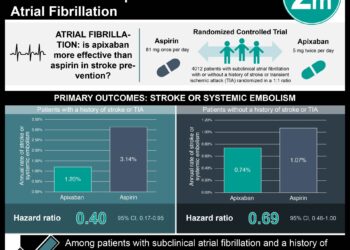The ESPRIT trial: Aspirin with dipyridamole after cerebral ischemia [Classics Series]
Image: PD
1. The combination of aspirin and dipyridamole was superior to aspirin alone in the secondary prevention of major vascular events
2. Patients on combination therapy were more likely to discontinue trial medication due to adverse effects
Original Date of Publication: May 20, 2006
Study Rundown: Daily aspirin as a secondary preventive measure has been shown to reduce the risk of vascular events in patients with a history of transient ischemic attack. There is, however, uncertainty as to whether dipyridamole in combination with aspirin has any additional benefit. The European/Australasian Stroke Prevention in Reversible Ischaemia (ESPRIT) trial is a large, multi-centre randomized controlled trial of aspirin with dipyridamole versus aspirin alone following cerebral ischaemia of arterial origin. When the results of this trial were included in a meta-analysis of combination therapy versus aspirin alone, a clear benefit was demonstrated in prevention of vascular death, stroke, or myocardial infarction (HR 0.80; 95% CI 0.66-0.98). A potential limitation of the study is its non-blinded design; however, outcomes were verified by an auditing committee that was unaware of treatment assignment.
In summary, the findings of the ESPRIT trial suggest that patients should be prescribed both aspirin and dipyridamole following cerebral ischemia of arterial origin.
Please click to read study in The Lancet
In-Depth [randomized, controlled study]: Published in the Lancet in 2006, this randomized controlled trial assigned 2,739 patients with a history of a transient ischemic attack within the past 6 months to receive a combination of aspirin and dipyridamole or aspirin alone. The primary outcome was a composite of death from all vascular causes, non-fatal stroke, non-fatal myocardial infarction or major bleeding complication. Of the patients assigned to the combination treatment, 470 (34%) discontinued the trial medication largely due to adverse effects, while 184 (13%) of the patients assigned to aspirin alone discontinued their medication. The primary outcome occurred in 173 (13%) patients assigned to combination therapy versus 216 (16%) of those assigned to aspirin alone (HR 0.80; 95% CI 0.66-0.98). The investigators updated a previously conducted meta-analysis with the addition of these results and found an overall risk ratio of 0.82 (95%CI 0.74-0.91) for the composite outcome of vascular death, non-fatal stroke or non-fatal myocardial infarction.
By Adrienne Cheung and Andrew Cheung, M.D.
© 2013 2minutemedicine.com. All rights reserved. No works may be reproduced without written consent from 2minutemedicine.com. Disclaimer: We present factual information directly from peer reviewed medical journals. No post should be construed as medical advice and is not intended as such by the authors or by 2minutemedicine.com. PLEASE SEE A HEALTHCARE PROVIDER IN YOUR AREA IF YOU SEEK MEDICAL ADVICE OF ANY SORT. Content is produced in accordance with fair use copyrights solely and strictly for the purpose of teaching, news and criticism. No benefit, monetary or otherwise, is realized by any participants or the owner of this domain.







